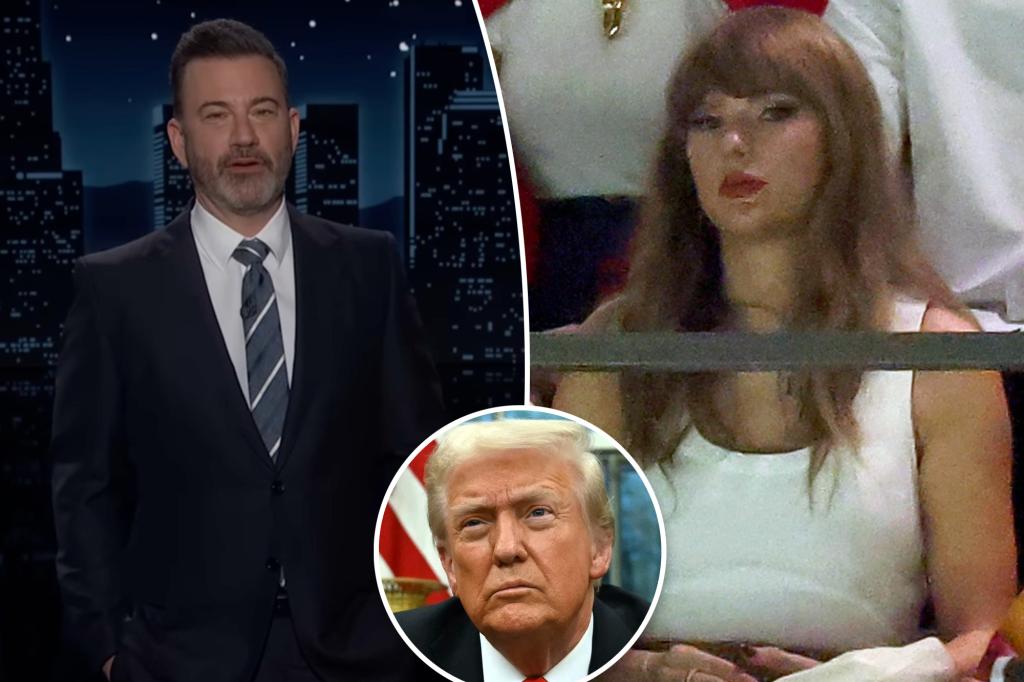The Super Bowl is not just a platform for exceptional football; it’s also a stage where celebrities and politicians convergence, often leading to memorable, and sometimes contentious, moments. This year, the event witnessed an intriguing exchange involving Jimmy Kimmel, Taylor Swift, and former President Donald Trump, highlighting the intersection of sports, celebrity culture, and politics.
The drama began when Taylor Swift, a global pop sensation, found herself at the center of attention during the game. Swift, known for her ardent fan base and chart-topping hits, was spotted supporting the Kansas City Chiefs. As she appeared on the jumbotron, she was met with a chorus of boos from Philadelphia Eagles fans. This reaction did not go unnoticed, as Trump quickly took to his social media platform, Truth Social, to comment on the situation. He remarked that Swift had a tougher night than the Chiefs, referencing the boos she received. Trump’s comment was typical of his style—acerbic and attention-grabbing, aimed at stirring a reaction.
Jimmy Kimmel, host of “Jimmy Kimmel Live!”, wasted no time in responding to Trump’s jibe. During his monologue, Kimmel clarified the situation, noting that Swift had not been booed out of the stadium but had, in fact, stayed for the entire game. This was a subtle yet pointed reference to Trump’s early departure from the event, highlighting a contrast between the two public figures. Kimmel’s response was laced with humor and sarcasm, underscoring the rivalry that often exists between celebrities and politicians in the public eye. He also emphasized that the boos were specifically from Eagles fans, likely due to Swift’s association with Travis Kelce, a star player for the Chiefs.
The context of the booing is crucial in understanding the dynamics at play. Swift’s support for the Chiefs, through her relationship with Kelce, naturally aligned her against the Eagles’ supporters. The harsh reaction from the crowd was as much about team loyalty as it was about Swift’s presence. Meanwhile, Trump’s attendance at the game was met with a mixed reaction. Some viewers noted that his appearance during Jon Batiste’s national anthem performance was intentionally timed to limit potential booing, yet a jumbled mix of cheers and jeers was still audible. This duality in reaction reflects the polarizing nature of Trump’s public image and the deep divisions he evokes.
Trump’s support for the Chiefs was not arbitrary. He expressed his admiration for quarterback Patrick Mahomes and his wife, Brittany Mahomes. Trump described Brittany as a “MAGA fan” and commended her public defense of him on social media. This exchange highlights Trump’s tendency to align himself with figures who support his brand and ideology, even in the context of sports. Conversely, his criticism of Swift followed her endorsement of Kamala Harris, illustrating how quickly political allegiances can influence public statements and the celebrities involved.
Travis Kelce’s reaction to Trump’s presence at the game offers a contrasting perspective. The Chiefs’ tight end viewed Trump’s attendance as an honor, emphasizing the significance of having a president at such a major event. Kelce’s comments reflect a more neutral, respectful stance towards Trump, focusing on the event’s prestige rather than political affiliations. This approach contrasts with the more politically charged interactions of Swift and Trump, showcasing how athletes navigate the complex interface of sports and politics.
In conclusion, the Super Bowl incident serves as a microcosm of broader cultural dynamics. The interactions between Swift, Trump, and Kimmel highlight the interplay of celebrity influence, political involvement, and public reaction. These moments remind us that even in the realm of sports, the lines between entertainment and politics blur, creating a space where personal and public identities collide. As such events unfold, they continue to captivate audiences, urging us to reflect on the roles we assign to public figures and the impact they have beyond their primary domains.
